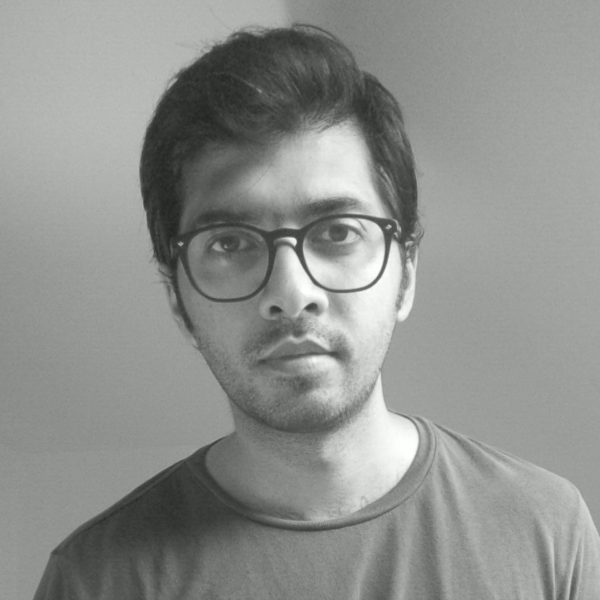
Image by Chris Ford.
Everyone Is an Equal Stranger
“I think, therefore I am.” Descartes’ vastly quoted refrain of existential philosophy is thrown into sharp relief in a reality distorted by today’s internet and social media. Sherry Turkle, an MIT sociologist and director of the MIT Initiative on Technology and Self recently updated the proposition to “I share, therefore I am.” And rightfully so.
Consider, for example, the modern philosopher or the public intellectual. The quintessentially post-internet problem, presented by social media to contemporary public intellectuals, is that one’s digital personhood is no longer an image of one’s being in the corporeal world, let alone a consequence of one’s thinking. It is only when one’s existence is projected onto the internet and then acknowledged on social media that one comes into being — digitally speaking, that is.
This modern peculiarity is only one of the many essential philosophical questions posed by the digital world. Exploring them, it seems, is now more crucial than ever, as our digital selves become an integral and almost indispensable part of our identities as individuals. The new personal tragedy is that we might think we exist, but unless someone retweets our tweet or likes our Facebook post, we are essentially left deeply questioning our existence as digital persons.
Now consider the present essay. Its true value aside, its impact will be judged to some degree by the number of clicks it will receive from readers, sending it up or down the list of “most-read” articles, by the number of users “liking” it on Facebook, and the number of times it will be shared on social media. Moreover, this piece of writing will be recommended to readers based in turn on their own digital selves as perceived by an algorithm.
But that’s not it. My own sense of self as a writer will become a function of this process that takes place in these digital spheres. The number of likes and shares my writing receives will virtually serve as social acknowledgement of my existence as a writer. This will occur closer to home, when my Facebook friends post this article on their walls and like it. It will occur on a more professional level when other authoritative social media users tweet about it and tag me in it, commenting on its added value and so forth. The bottom line being that if none of this were to happen, I would feel like a lesser-being, my sense of self reduced somehow, my existence as a digital person left unacknowledged. This, one must reckon, is an existential problem of a novel kind.
As an extrapolation of our digital selves, there is also then the question of collective identity. The interconnected digital space has created new processes for the formation of collective identity as well. The recently triumphant gay rights movement is a case in point. More than 26 million Facebook users changed their profile picture to a rainbow flag in the wake of a landmark U.S. Supreme Court decision that made same-sex marriage a right nationwide in June. The “celebration of pride” was, moreover, a transnational phenomenon, much like the green profile filters in support of the Iranian protesters in 2009, and not just limited to American or Iranian Facebook users.

Online socio-political activism, as also demonstrated by the globally trending hashtags on Twitter, demonstrates how digitally formed collective identity pervades the idea of territory that has been so essential to traditional collective identity formation. This perforation of territory by social media raises questions about the ontology of the digital space and the internet as a whole.
In historical terms, the invention of territory as a way of articulating a spatially finite Earth transformed the fate of humanity when families and clans lay claim to homes and tribal plots, or kingdoms and nations emerged to exclusively claim portions of the Earth’s surface. Territory became such a fundamental basis of our way of being in the world that today we take it for granted. But the internet represents, in likeness of what the philosopher Kant called the “uninhabitable parts of the earth,” an aterritorial space.
Such is the nature of the internet: no one may exclusively possess it, but it can instead be articulated as a space of pure communication or translation. Moreover, the laws of the Earth that define the guest/host relationship do not extend to such a space either, because there is no master, consequently no host. Everyone is equally a stranger.
Given the nature of the internet, we might then conceive of the digital person as being in exile from the territorial reality of the world — as a sort of projection of her corporeal self. The Italian philosopher Giorgio Agamben, in his musings about the future of humanity, conceptualized aterritorial space as somewhere that is habitually uninhabited and where political communities exist in a condition of exodus from each other. This is a way of being in which communities are not separated by uncertain and threatening boundaries, and personhood as such is not subscribed via citizenship of a territorial state. This, Agamben writes, is a space where truly cosmopolitan communities “articulate each other via a series of reciprocal extra-territorialities in which the guiding concept would no longer be the ius (“right”) of the citizen but rather the refugium (refuge) of the singular.”

While it is true that states, in their truly territorial proclivities, continue to increasingly police the internet, enforce security mechanisms, and restrict access to information, such measures are by no means absolute. State sovereignty is still a fiction in the digital space, and given the aterritorial nature of it, is always likely to remain so.
The wonderful thing about the digital space is that belonging in it is not an exclusive enterprise — unlike belonging in corporeal society, which is dictated by nativity and territory, and formally bestowed only by a sovereign state. Rather, the internet is, by its very nature, inclusive. Digital beings confer digital personhood on each other, as in Agamben’s community of the future, by acknowledging each other reciprocally as “followers,” and through retweets and tags and likes. The case of the dating app Tinder is a telling one where users match only when they reciprocally acknowledge each other through a swipe of the thumb to the right — a recognition of each other’s social inclusion, and of course, of mutual attraction.
While Agamben may have conceived his communal space as an evolved form of corporeal society, the internet, however, is a potential platform where we may already foresee the projected forms of our shared future. Nevertheless, to fully articulate this potential the philosophical inquiry of the digital space in a more traditional sense is essential and increasingly indispensable to the meaning of “being” in the world. So, whether you are an internet-savvy millennial or still catching-up with the cool crowd, you will find yourself grappling with this sooner or later: To share, or not to share, that is the new existential question.


Share your reflection